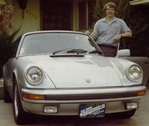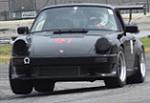non OEM wheel safety
4 posts
• Page 1 of 1
non OEM wheel safety
So many non OEM wheels so many prices, how does one figure out if a particular wheel is safe for daily and autocross use?
- oregonduckman
- Member
- Posts: 44
- Joined: Sun Jan 06, 2008 4:23 pm
I think for daily use, any wheel is okay.
For autocross - same, but weaker wheels might fatigue after many thousands of laps.
Of course this assumes no defects in the wheels (like viods inside a poorly cast wheel).
Where the quality of the wheel is important is two areas; 1) weight - Forged can generally be made lighter.
2) Severe incident strength - Forged wheels rarely break in an accident, and will hold up to repeated impacts
(like driving over the 'gators on a racetrack) much better than the more brittle cast wheels.
I use only forged wheels on my track cars.
Bottom line - unless the wheel is defective (casting voids), you can probably get away with anything for autocross.
All this is my opinion, of course.
For autocross - same, but weaker wheels might fatigue after many thousands of laps.
Of course this assumes no defects in the wheels (like viods inside a poorly cast wheel).
Where the quality of the wheel is important is two areas; 1) weight - Forged can generally be made lighter.
2) Severe incident strength - Forged wheels rarely break in an accident, and will hold up to repeated impacts
(like driving over the 'gators on a racetrack) much better than the more brittle cast wheels.
I use only forged wheels on my track cars.
Bottom line - unless the wheel is defective (casting voids), you can probably get away with anything for autocross.
All this is my opinion, of course.
Paul D. Young http://www.deadpetsracing.com/
PCA Nat'l Club Race Advocate
Now: '78 911SC, '79 911SC, '04 955-S, '06 997-S, '88 924-S, '16 92A
Past: '74 914, '78 911SC, '78 928, '80 924-S, '82 931, '86 930, '03 996-4S
PCA Nat'l Club Race Advocate
Now: '78 911SC, '79 911SC, '04 955-S, '06 997-S, '88 924-S, '16 92A
Past: '74 914, '78 911SC, '78 928, '80 924-S, '82 931, '86 930, '03 996-4S
-

pdy - Time Trialer
- Posts: 466
- Joined: Thu Aug 05, 2004 2:32 pm
- Location: 2nd Place - Usually
I like Paul's recommendation for forged aluminum wheels, particularly from the Porsche wheel program, but they stop at 16" unless you consider the latest 19" Turbo wheels. Make sure you don't get cast copies of the forged factory wheels.
There are a lot of manufacturers coming out with forged wheels lately Champion, HRE, Fikse, Forged line, BBS, Ray's engineering come to mind.
I think if you get cast wheels that meet the DOT Department of Transport USA, JWLT Japanese Light Alloy Wheel, JIS Japanese Industry Standard, or German TUV Certification you will do best. Usually this is indicated on the wheel or in the advertising for the wheel.
Some specialty wheel makers don't have these certifications and you have to go with their reputation.
Also some wheels from the racing program of normal TUV manufacturers like BBS are not really suitable for street use (and don't have TUV certification either) and should be regularly inspected if used for track purposes. These wheels have thin rim sections to save weight and will fold if a speed bump is hit too vigorously. Also, if they are made of magnesium, they may not have the anti-corrosion coating required for prolonged exposure to the elements that street use requires and thus may have corrosion induced failures over time.
The very best wheels are forged magnesium like the Carrera GT u$e$ if you are into sweet dreams...
There are a lot of manufacturers coming out with forged wheels lately Champion, HRE, Fikse, Forged line, BBS, Ray's engineering come to mind.
I think if you get cast wheels that meet the DOT Department of Transport USA, JWLT Japanese Light Alloy Wheel, JIS Japanese Industry Standard, or German TUV Certification you will do best. Usually this is indicated on the wheel or in the advertising for the wheel.
Some specialty wheel makers don't have these certifications and you have to go with their reputation.
Also some wheels from the racing program of normal TUV manufacturers like BBS are not really suitable for street use (and don't have TUV certification either) and should be regularly inspected if used for track purposes. These wheels have thin rim sections to save weight and will fold if a speed bump is hit too vigorously. Also, if they are made of magnesium, they may not have the anti-corrosion coating required for prolonged exposure to the elements that street use requires and thus may have corrosion induced failures over time.
The very best wheels are forged magnesium like the Carrera GT u$e$ if you are into sweet dreams...
-

Bob Gagnon - Time Trialer
- Posts: 279
- Joined: Fri Jul 16, 2004 9:34 pm
- Location: La Jolla
... something else to consider: there are a lot of 3-piece wheels out there that look good with small bolts/hex screws holding them together. While light, visually attractive, and easy to repair if damaged, these multi-piece wheels require regular maintenance and inspection. So if you're thinking of a 3-piece bolt-together set, consider the maintenance needs. I, too, agree with Mr. Young: forged 1-piece wheels are a great wheel for many uses. My personal favorite (especially for the track) is the Fuchs (or Fuchs-centered ... like Wiedman's makes), but that's just me ....
My 2-cents, and these, too, are just one man's opinion.
Good luck.
My 2-cents, and these, too, are just one man's opinion.
Good luck.
Dan Chambers
"It's just a "well prepared" street car ... or a very, very well-mannered track car."
1983 SC #91 3.6L, "Black Pearl" Livery
1987 944 (gone but not forgotten)
"It's just a "well prepared" street car ... or a very, very well-mannered track car."

1983 SC #91 3.6L, "Black Pearl" Livery
1987 944 (gone but not forgotten)
-

Dan Chambers - Pro Racer
- Posts: 1761
- Joined: Wed Jun 30, 2004 3:57 pm
- Location: San Diego
4 posts
• Page 1 of 1
Who is online
Users browsing this forum: No registered users and 143 guests
